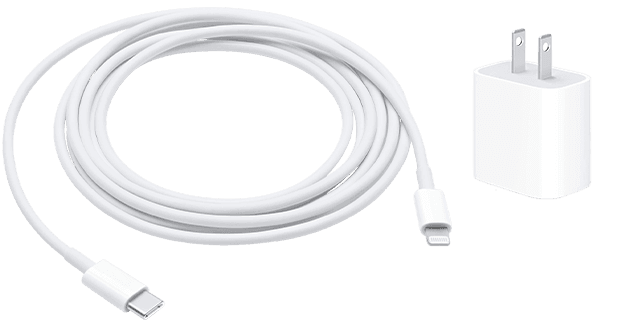If your iPhone or iPod touch won't charge
If your battery won't charge, charges slowly or an alert message appears, find out what to do.
If your device won’t charge
Follow these steps and try again after each step:
Plug your device into one of these power sources:
Computer
Power accessory
Wall power socket
Check your charging cable and USB adapter for signs of damage, such as breakage or bent prongs. Don't use damaged accessories.

Use a wall power socket and check for firm connections between your charging cable, USB wall adapter and wall socket or AC power cable, or try a different socket.
Remove any debris from the charging port on the bottom of your device, then plug your charging cable firmly into your device.

Let your device charge for half an hour.
If your device still won’t power on or if the screen displays a battery icon, force restart your device:
iPhone 8 or later and iPhone SE (2nd generation and later): press and quickly release the volume up button. Press and quickly release the volume down button. Press and hold the side button until the Apple logo appears.
iPhone 7, iPhone 7 Plus and iPod touch (7th generation): press and hold both the side (or top) button and the volume down button until the Apple logo appears.
iPhone 6s or earlier, iPhone SE (1st generation) and iPod touch (6th generation) or earlier: press and hold both the side (or top) button and the Home button until the Apple logo appears.
Let your device charge for another half an hour.
If your device still won't power on or charge, you may need a service. Get a service
If your device stopped charging at 80 per cent
iOS 13 and later use Optimised Battery Charging to slow the rate of battery ageing by reducing the time your iPhone spends fully charged. Your iPhone uses on-device machine learning to understand your daily charging routine so it can wait until you need to use your iPhone to finish charging past 80 per cent.* Optimised Battery Charging is only active when your iPhone predicts that it will be connected to a charger for a long period of time.
Your iPhone may get slightly warmer while it charges. To extend the lifespan of your battery, software may limit charging above 80 per cent if the battery gets too warm. Your iPhone will charge again when the temperature drops. Try moving your iPhone and charger to a cooler location.
Find out what to do if your battery gets too warm
With iPhone 15 models and later, you may have a charge limit, which will stop your iPhone from charging past a set limit. If you want your iPhone to charge past 80 per cent, change your charging limit.
Find out more about Charge Limit with iPhone 15 models and later
If an alert says that your charging accessory isn’t supported or certified
Connect your device directly to the charger, without any adapters or other equipment between your device and the charging accessory.
Remove any debris from the charging port on the bottom of your device.
Try a different USB cable or charger.
These alerts can appear for a few reasons:
Your iOS device may have a dirty or damaged charging port
Your charging accessory might be defective or damaged
Your USB charger might not be designed to charge devices
Find out more
Find out what to do if your iPad won’t charge or if the battery in your iPhone drains too quickly.
Find out what to do if your device won’t turn on or is frozen.
Find out how to identify counterfeit or uncertified Lightning connector accessories.
* Information regarding your charging routine is stored only on your iPhone. The information isn't included in backups and isn't shared with Apple.